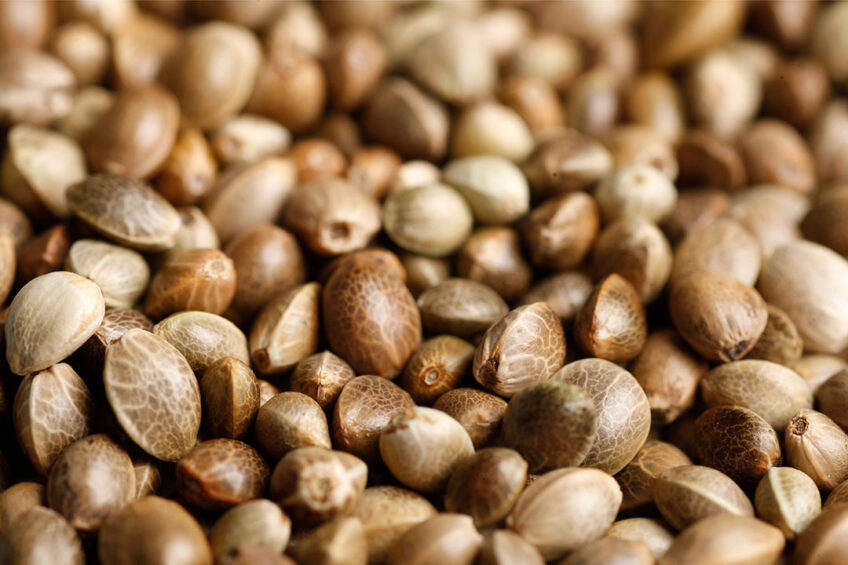What’s new in the world of hemp in livestock feed?

A roundup of what’s happening with hemp in livestock feed around the world. In some jurisdictions, industrial hemp is already being used in feed, and others are about to.
The incorporation of ‘alternative’ crops such as hemp in livestock feed is receiving a lot of attention right now, and for good reason. The global feed industry needs more options as it’s currently strained by unprecedented forces, from labour strikes across Europe, the Ukraine war and high energy costs to strained international trade relations. Feed costs are very high, so more crops that can be locally produced, that are nutritious and that are also hardy and drought-resistant are in demand. Hemp fits the bill on all 3 of these fronts.
“In most EU countries, hemp is now approved for use as an animal feed as long as the hemp ingredients are tested to ensure that they are below approved standards for THC (the primary biochemical intoxicant ‘cannabinoid’ that is generally maximised in production of the cannabis plant),” explains Jim Schroeder, co-founder of AltaGreen, a hemp development company in Canada.
“US and Canadian feed regulators want approved standards for testing for potential of residual terpene conversion to THC,” he says. “They also want each individual part of the hemp plant that will be used in animal feed to be tested and registered as an individual ingredient, with subsequent testing of a compound formulation of the total feed using the ingredient.”
AltaGreen’s focus is therefore on using hemp seed meal and hemp seed oil as a compounded proprietary formulation using 2 hemp seed components in conjunction with other ingredients. “This is a project designed to achieve the registration of one formulation,” says Schroeder.
If funding can be secured, this project, which will focus on pelleted poultry feed, will be conducted in conjunction with Innotech Alberta, the University of Alberta Poultry Research Centre, third-party labs approved by the Canadian Food Inspection Agency and poultry industry stakeholders.
Several hemp research projects are also being carried out by the Canadian Feed Research Centre.
Study: Effects in broiler digestive tract
Some other studies examining hemp in poultry diets have already been completed. Among them is a brand new study by scientists in the Czech Republic published in March 2023, which examined the effects of hemp seed and flaxseed on enzyme activity in the broiler chicken digestive tract. The scientists note that “the activity of enzymes in the digestive tract is an important parameter for appropriate digestive tract function,” and that “flaxseed and hemp seed are commodities and significant sources of nutrition, and their addition to feed could change enzymatic activity in the digestive tract and improve nutritional intake.”
The study
The scientists studied the broad effects of flaxseed, hemp seed and a combination of both on enzyme activity across all the main enzyme groups. These included the polysaccharidases (e.g. amylase, cellulase, pectinase, xylanase and inulinase), disaccharidases (maltase, invertase and lactase), as well as proteinases and lipases.
- Control group
The control group was fed no flaxseed or hemp seed, one group received 80 g/kg flaxseed, the third 40 g/kg hemp seed, and groups 4, 5 and 6 contained a mixture (80 and 30 g/kg, 80 and 40 g/kg and 80 and 50 g/kg flaxseed and hemp seed, respectively). - Enzyme activity
“Enzyme activity was found to depend on the location in the digestive tract and the composition of the feed mixture,” the team concluded. “Most enzymatic conversion occurs in the ileum, where the addition of flaxseed and hemp seed to the diet increased most enzyme activities, namely, amylase, cellulase, pectinase, xylanase, maltase, invertase, proteinase and lipase activities. The highest values of enzyme activity were found in groups fed a combination of flaxseed and hempseed, especially in chickens fed flaxseed and hemp seed at 80 and 50 g/kg. - Growth performance
Growth performance results aligned with the enzyme activity results, with bird weights increasing after the addition of flaxseed and/or hemp seed. “These findings have economic implications,” concluded the scientists, “suggesting that feeding a diet with a combination of flaxseed and hemp seed is beneficial.”
Hemp vs soybean in broilers
A Master’s thesis was also completed at Murray State University in Kentucky on the incorporation of hempseed in broilers, in comparison to soybean meal (SBM). The diets consisted of a grower concentrate with no hemp seed and 15% SBM, 10% hemp seed and 5% SBM, and 15% hemp seed with no SBM. Average daily weight gain and carcass yield was similar among the diets, but the 15% hemp seed diet had the worst feed conversion rate. The hemp seed fibre content was also higher than recommended for broiler nutrition. It was concluded that “Adjustments to the diet should be made to determine the correct amounts of protein and fibre.”
Cattle results
Just recently, in April 2023, scientists at the USDA and North Dakota State University published a study finding hempseed cake is a highly nutritious alternative feed source for cattle.
In muscle (meat) and various organs, very low levels of the cannabinoids THC and CBD were found.
This followed a study published in 2020 in which researchers found that multiple cannabinoids could be detected in the cattle blood after feeding hemp flowers, where cannabinoids are concentrated, but they also noted that cannabinoid concentrations are not uniform across hemp varieties.
Much hemp breeding progress has been made in Canada and beyond, and hemp food products are becoming much more common.
US regulations
In the USA in early 2022, the Association of American Feed Control Officials (AAFCO), along with 17 other organisations issued a joint open letter to state agriculture leadership, calling on them to support greater education and scientific research to ensure the safety of hemp in feed.
This followed a letter, which was sent a few months earlier, from the National Industrial Hemp Council of America (NIHC) to the US Food and Drug Administration (FDA) calling for approval of hemp as an animal feed ingredient. Prior to that, NIHC and AAFCO had hosted a webinar that brought together officials from the FDA, the US Department of Agriculture (USDA) and others. The 1,000+ attendees included state regulators, veterinary professionals and hemp industry advocates.
State activity
- In Montana, a law was passed in 2021 to include hemp in the definition of commercial feed for pet food (including for turtles, hamsters, ferrets) and horse feed.
- In Kansas, a first bill to legalise hemp for livestock feed and pet food has just failed. (At one time, Kansas was one of the main hemp-producing states, and the plant still grows wild in many areas. There are 3 companies ready to process hemp located in the state.) – Bill HB 2168 was debated in March 2023, but the Kansas Department of Agriculture opposed it.
However, industry advocates continue to work towards legalisation. Rather than have such a broad focus, as the last bill had, they are planning a bill that’s more specific, with a focus on permitting hemp in horse feed, pet food and perhaps also poultry feed.
Horses
A US hemp industry website states that “horses can be fed high-protein hemp forage or milled and pelletised spent non-solvent derived biomass with 25% crude protein, 97% dry matter and 68% total digestible nutritional values with a high relative feed value of 225. Hemp seed meal or seedcake, a byproduct of oil pressing, yields between 35-40% crude protein, on a par with dried distillers grain (DDGs) and other oilseed meals such as linseed and canola.”
Aquaculture
In aquaculture applications, hemp has huge potential to replace fish meal for protein and fatty acids. Indeed, some suggest that aquaculture may be the largest market for hemp among all livestock types.
Developments in Australia
In Australia, although hemp currently cannot yet be used as a livestock forage, a study by the government on hemp for sheep finished in mid-2022. It sought to understand the effects of consuming hemp biomass on growth performance and carcass traits of sheep, and to measure cannabinoid excretion from sheep and accumulation in tissues. Analysis of the results is not yet available.
In February 2023, a hemp variety trial field day was held at the Horticultural Research Institute in Manijimup, Australia for farmers to inspect varieties and discuss agronomics.







